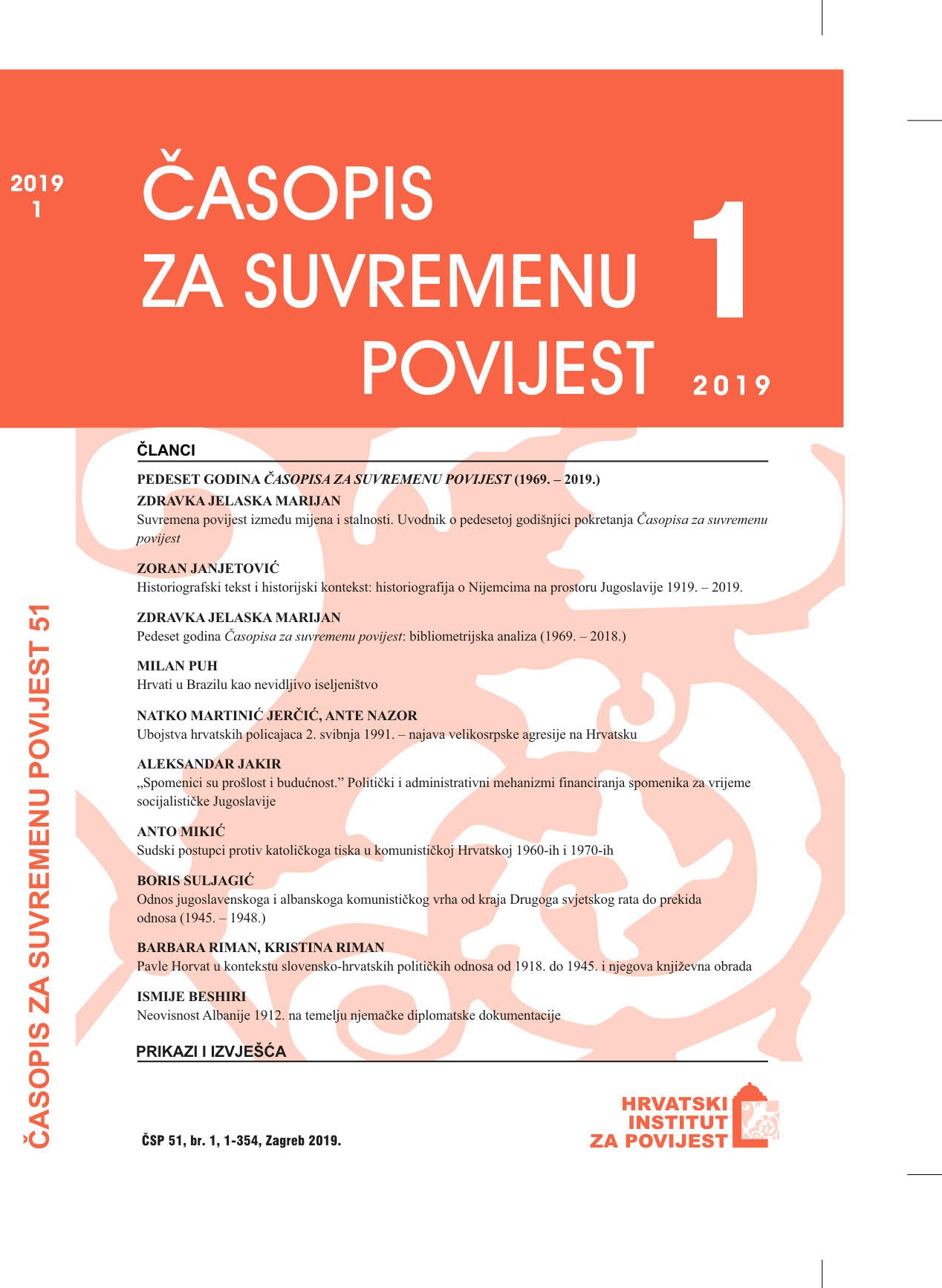Historiografski tekst i historijski kontekst: historiografija o Nijemcima na prostoru Jugoslavije 1919. – 2019.
Historiographical Text and Historical Context: Historiography on the Ethnic Germans in the Territory of the Former Yugoslavia 1919–2019
Author(s): Zoran JanjetovićSubject(s): Recent History (1900 till today), Interwar Period (1920 - 1939), WW II and following years (1940 - 1949), Post-War period (1950 - 1989), Transformation Period (1990 - 2010), Present Times (2010 - today)
Published by: Hrvatski institut za povijest
Keywords: Germans; Ethnic Germans (Volksdeutsche); historiography; Yugoslavia; Slovenia; Croatia; Vojvodina; Bosnia and Herzegovina; World War II; camps;
Summary/Abstract: The paper deals with the representation of the Ethnic Germans (Volksdeutsche) in the historiography of the territory once comprising Yugoslavia. The author divides his subject matter according to regions (Slovenia, Croatia, Serbia, and Bosnia-Herzegovina) and periods (inter-war, communist, and post-communist). During the first period, the Volksdeutsche were not a prominent topic in historiography of the three leading Yugoslav peoples, not even in Slovenia, which had the longest history of ethnic strife between the Slovenes and the Germans. It was the Ethnic German authors who published the most works on the Volksdeutsche in this period. Most of them appeared in the 1930s, as many Danube Swabian settlements celebrated the 150th or 200th anniversaries of the arrival of the Germans.After WWII, in which the Ethnic Germans had sided with the invaders and were afterwards collectively punished by the new communist authorities, they acquired the image of the “bad guys” of post-war historiography. During the first 15-odd years, works on them were scarce, although several official papers and memoranda enumerating their war crimes and treasonable activities before and during WWII were written soon after the end of the war. In the course of the 1960s, several important works appeared and set the trend for the 1970s and part of the 1980s. Most of them were published in Slovenia. These works also covered the longest time span. In other parts of Yugoslavia, works on the Volksdeutsche usually dealt with their colonization or with WWII. Works on WWII always insisted on German war crimes, persecution of Jews, and combat against the Partisans.Since the mid-1980s, the image of the Volksdeutsche has become more realistic and less biased. Slovene and Austrian historians organized a conference in 1984 (that engendered a collection of papers in 1986) on the Germans in Slovenia 1848–1941, which made the new trends plain to see. In other parts of the country, several works on the Volksdeutsche Partisan company appeared.During the second half of the 1980s, as the communist political and economic system started to dilapidate, historiography posed new questions, discovered new topics, and opened new approaches. The revision and questioning of decades-long myths and established truths began.This trend boomed after the break-up of Yugoslavia and collapse of the communist system. Communist crimes at the end of WWII – and the atrocities against the Volksdeutsche – became one of the best-researched topics. Gradually, other German-related topics were taken up and – although old views still persisted here and there – the German minority became part of national histories once again. This production has been very lively in Slovenia and especially in Croatia, whereas the number of works in Serbia, and especially in Bosnia-Herzegovina, has lagged behind.
Journal: Časopis za suvremenu povijest
- Issue Year: 51/2019
- Issue No: 1
- Page Range: 13-57
- Page Count: 45
- Language: English, Croatian

